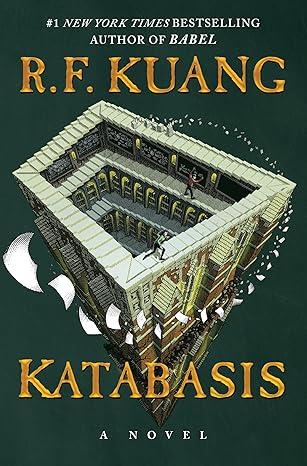Katabasis

Author: Kuang, R.F.
Tags: fantasy, audio, satire
Timeline: between Friday, August 29, 2025 and Thursday, September 11, 2025
It is the late 1970s and Alice, a female grad student in Cambridge’s department of “analytical magic” goes on a mission in hell where she discovers that much of hell bears a striking resemblance to life in academia. Most of the book is told by Alice in the form: action followed by an illuminating flashback; and most of the flashbacks are about Alice’s painful experiences at Cambridge with Professor Grimes her graduate advisor, the patriarchy in general and her unrequited crush on Peter (who, also a magician, is tagging along in hell).
Peter Murdoch and his bird’s-nest hair, scarecrow limbs balanced atop a rickety bicycle, looked like he’d never tried at anything in his life. He was simply born brilliant, all that knowledge poured by gods without spillage into his brain.Alice couldn’t stand him.
Of course, the trope is that Alice and Peter are in love but too stupid realize it. And the mission: recover Professor Grime’s soul from hell and resurrect him. (Because Grimes was killed while performing a spell with Alice’s assistance, she believes she was responsible for his death. Also she needs her advisor back.)
The dominant theme of the story is Alice’s excruciating experience as a woman in academia walking a tightrope of success under constant judgement from the male establishment. The reader never understands her real motivation; it seems to change different different recollections of Grimes’ verbal abuse, his ridiculous slave driving, his sexual predation to the point where she considers suicide; yet at the same time, “she knew what she was getting into and she will keep a stiff upper lip” because Grimes is an academic superstar, her “meal ticket” and she believes that her career will be over without his support. In a nutshell, Alice has strong but very mixed emotions about her academic career and her advisor.
In addition to the primary narrative provided by Alice, the book also has portions narrated in third person to provide background. The overall production of the book is excellent and I particularly enjoyed the deep male voice of the omniscient narrator who voices the following:
**On Magick**Magick, the most mysterious and capricious of disciplines, admired for its power, derided for its frivolity, is in brief the act of telling lies about the world.
What magicians of ancient civilizations discovered through accident and ingenuity, and what the English philosopher-magicians of the eighteenth century onward codified into the Euro-American received canon, was that the natural laws of the world were set but fragile. You could cleverly reinterpret them. For brief periods of time one could even bewilder and suspend them, so long as you spun the right web of untruths. Linguistic trickery, logical conundrums, it all worked.
…And that’s the overall premise of magic in the book, along with drawing pentagrams using chalk or blood. I found the magic as a plot device was well developed enough to enjoy having it used throughout the story without pausing to think, “this is bullshit”. For example, sprinkled throughout the story there is discussion of magician’s chalk, it’s varieties and brand names (Barkle’s vs Shropley’s).
Another distinctive aspect of this book is that it is slathered with references not only to literature about Hell (Dante, Orpheus), but also, science, math and logic (especially paradoxes) and according to TikTok some readers found this annoying. I think this is overblown because you are given context for all these little mentions, and it is not necessary to know any of the referenced texts. Lastly there is some humor in the book, but, reflecting it’s academic theme is subtle, for example, at one point a text is mentioned in passing: Penhaligon’s Primer on the Unitarian Hell. But did you know that Unitarians don’t believe in Hell? Ha Ha! And yes, I chuckled, but that just makes me smug and pedantic.
My biggest complaint with the book is that the ending while not totally predictable, was at the same time, not a giant surprise.